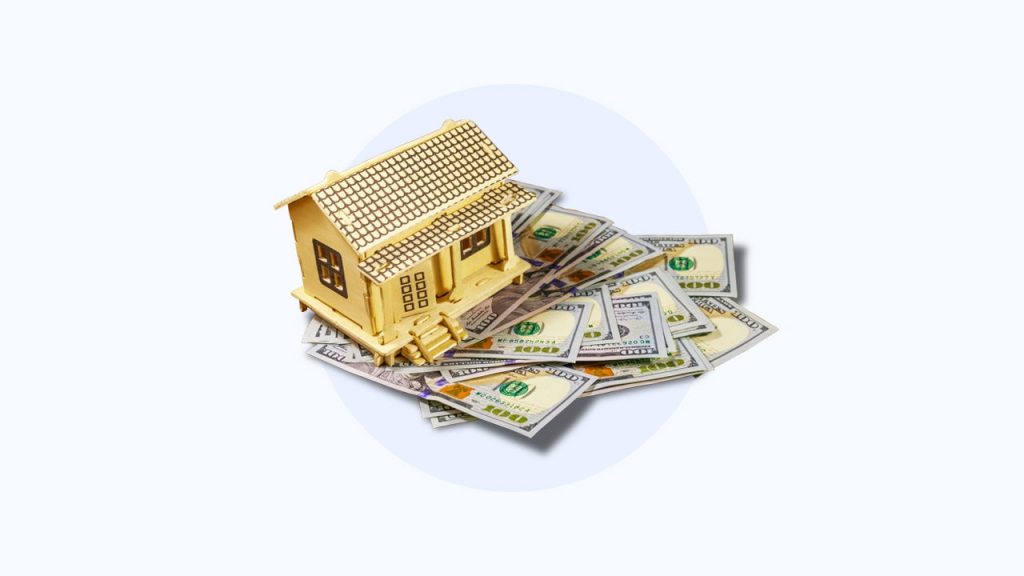Key takeaways
- The idea of using home equity for investment is appealing, especially given the current rise in home values and the stock market’s strong performance.
- But it comes with significant risks, including investment volatility, potential for substantial monetary losses, and even the loss of your home.
- Factors to consider include the amount of equity you possess, the strength of your credit score, and your borrowing costs (the loan’s interest rate and other fees).
- Alternatives include buying stocks on margin or doing a cash-out refinance, both of which feature lower interest rates than home equity loans and HELOCs.
Even if the value of your home is racing ahead in today’s high-priced housing market, you might still feel woefully behind in other aspects of your financial life. The latest edition of the Bankrate Retirement Savings Survey shows that more than half of Americans (57 percent) feel behind on their current level of retirement savings. Only half (49 percent) of those who have a financial retirement goal in mind feel it’s likely they’ll be able to save enough to meet that magic figure — especially since 1 in 3 (35 percent) believe they’ll need more than $1 million to be able to make it through their post-working years.
Savings alone won’t do it: Investing is key to building a nest egg and meeting other major expenses and dreams. But it takes money to make money, and if you can’t earn enough to invest, should you think about borrowing some — specifically, from your home equity, the worth contained in your property? After all, it’s wealth you’re sitting on (literally), and its value has probably increased of late. Why not put it to work for you to chase growth opportunities?
While tapping your home equity to invest may sound like an appealing strategy, it comes with serious risks. Here’s what you need to know.
Why it’s tempting to use home equity to invest
Why are people thinking about using their home equity to invest? Because they have a lot of it, for one thing: The unprecedented rise in home prices/property values of the last few years has sent equity stakes soaring. But, unlike a stock that pays dividends, an appreciated home doesn’t do you any active good: You can’t access its wealth unless you sell it or borrow against it.
Next, look at the performance of the stock market. Though it had a rough stumble at the onset of the COVID-19 crisis, and again in 2022, the market overall has been high-flying: In the last five years, it’s posted an annualized return of 11.33 percent. In 2023, the S&P 500 returned more than 26 percent. It’s up by 21 percent so far in 2024 (as of early November).
In fact, the whole borrow-from-home-to-invest strategy got a lot of play during the pandemic, when the market was posting double-digit gains while interest rates on home equity loans and home equity lines of credit (HELOCs) were hovering at, or even below, 4 percent.
Admittedly, borrowing has gotten more expensive since: Home equity rates have doubled since the low-low days. But ever since the Federal Reserve began lowering interest rates in September, they’ve steadily declined. And, amid the prospect of more Fed rate cuts in the near future, some borrowers are eyeing the potential intersection between cheaper loans and appreciating home values as a chance to grow their wealth.
The idea has special appeal for younger homeowners, those aged 28 to 43, who may have stretched themselves to buy a place and haven’t built up much in savings or retirement accounts. When Bankrate’s Home Equity Insights Survey asked homeowners what would be a good reason to tap their equity, 30 percent of millennial homeowners cited “making other investments” (“other” being other than for the home).
Older homeowners — those of the Gen X and baby boomer generations — were less sanguine about using home equity to invest. Only 13% and 8%, respectively, thought it a good idea, the Home Equity Insights Survey found.
What can you use home equity to invest in?
Once you close on and receive funds from a home equity loan or a HELOC — the most common ways to tap your equity stake — you can use them to invest in just about anything: stocks, bonds, mutual funds, ETFs and real estate. (Do check with your lender, though: Some may prohibit using home equity funds for investments or as a down payment on a property if you’re financing the rest of it with a mortgage.)
It’s important to think about what kind of investments you’re planning to pursue. Say you want to dabble in real estate. Investing in REITs, publicly traded real estate investment trusts, is convenient, but control of the properties is completely out of your hands. In contrast, buying an investment property in an area with a history of proven rental demand may offer a predictable revenue stream. Plus, you can have a bit more control: If no tenants nibble, you can lower the rent or lease.
Additionally, some small business owners use home equity financing to bet on themselves: If you have a business plan in place, a home equity loan or a HELOC may be able to help you secure the funds you need to take your venture to the next level.
Is it a good idea to tap home equity to invest?
Brian Baker, CFA, senior writer, investing and retirement at Bankrate, says that if someone came to him wondering about tapping home equity to invest, he would advise using “extreme caution.”
“Using the money to invest in something like stocks may sound like a good idea because of the high return potential, but stocks can be quite volatile in the short term,” Baker says. “It’s not uncommon for stocks to fall 20 percent or more over short time periods.”
Casey T. Smith, president of Georgia-based Wiser Wealth Management, a financial advisory firm, echoes those concerns. “When markets are as high as they are now, greed does tend to sit in, and often, we will get questions about investing with borrowed money,” Smith says. “The reality is there could be a double-digit decline in the market at any time for many reasons.”
And such drops can easily wipe out gains. That’s why it’s important to look at average market performance over several years — especially if you’re also dealing with decades-long debt, as home equity loans and HELOCs generally are. Over the long term, the stock market does usually appreciate — but the overall returns are much less dramatic than a single year would indicate.
Average stock market performance over time
| Period | Average return, S&P 500 | Average return, S&P 500 adjusted for inflation |
|---|---|---|
| Last 5 years (2018 to 2023) | 11.33% | 7.28% |
| Last 10 years (2013 to 2023) | 12.39% | 9.48% |
| Last 20 years (2003 to 2023) | 9.75% | 7.03% |
| Last 30 years (1993 to 2023) | 9.90% | 7.22% |
| Source: Macrotrends, SoFi |
The risks of using home equity for investing
So, what are the main downsides of tapping your home equity to invest?
- You’re taking on more debt: There are several ways to tap your home equity. No matter what route you take, though, the outcome is simple: You’re adding to your overall debt load. Higher debt comes with higher monthly payment obligations that can impact your lifestyle — or impede your ability to save for emergencies.
- You could lose your home: The worst-case scenario with any home equity loan is simple: The lender can take your home if you fail to make your payments. That’s why just about every financial planner will advise against borrowing against equity to invest. No matter how nice it sounds to score a huge return from an investment, it shouldn’t cloud your brain from recognizing the need to have a roof over your head.
- You could lose a lot of money: You don’t know what your investment will do – it could go up, or it could go down. However, you know exactly what your lender expects: an on-time payment every month. If your investments don’t perform well, you could easily end up with a net loss. “The client would have to be comfortable making a payment on the loan while also watching the investment drop below the loan amount,” Smith says. “To make matters worse, what if it was a 2008-like recession and the homeowner lost their job at the same time?”
What should you consider before using home equity to invest?
If the sizable risks haven’t already scared you away from this strategy, you need to think about two key questions.
Can you consider yourself wealthy? If the answer is ‘yes’, this is the only way that Smith would advise tapping into home equity. “If [people] have a $5 million home or multiple $5 million dollar homes, it’s really hard for them to leave all that cash just sitting there,” Smith says. “They typically will leverage these properties to invest back into their businesses or in other nontraditional investments. These families typically have $1 million or more a year in income from multiple sources making the risk less for them.”
How much home equity do you have? If you’re not ultra-rich, are you at least equity-rich – that is, your outstanding mortgage balance is less than half of your home’s value? When deciding how big of a HELoan or HELOC to extend you, lenders consider what the sum total of all your home-based debt will be, including the primary loan. Frankly, having paid off the majority of your mortgage is the only way you’ll be able to borrow a significant amount to play with.
Is your credit strong? The robustness of your credit score and other financials plays a key role in the interest rate you’ll be offered: the higher the score, the lower the rate. That’s true of any financing, of course, but it becomes particularly pertinent here, because you need as much spread between the investment rate of return and borrowing cost as possible. Home equity borrowers tend to have strong scores: In 2023, the average FICO score was 742 for HELoans and 760 for HELOCs, according to the Mortgage Bankers Association. Which leads us to …
What will you pay to borrow the money? “Someone should consider the interest rate they’re paying on the loan,” Baker says. “If you’re paying an interest rate of 8 percent, your investment needs to outperform that amount, which is a pretty high hurdle.” Consider that the annual stock market return averages 10 percent. With average home equity loan rates currently around 8.50 percent, your return would perform approximately 1.5 percent above your borrowing costs, based on historical trends – and that’s only if the stock market delivers that 10 percent annualized return. It’s a tight margin — and that rate average is the basic interest, not the overall loan APR. Some home equity loans and HELOCs have closing costs. While these tend to be less than those for mortgages, they can still add up to thousands on a five-figure loan.
Doing the math on home equity costs vs. investing returns
Consider the interest rate balancing act that Baker highlights by looking at the figures below:
| Loan term | 10 years |
|---|---|
| Interest rate | 9% |
| Amount | $50,000 |
| Monthly payment | $633.38 |
| Lifetime interest | $26,005.46 |
In other words, it’s not so simple that if you borrow $50K, all you need to earn is $50K back. Instead, you would need an investment that paid a minimum of $76,005.46 over 10 years – and that’s just to break even. To make a profit, it would need to earn even more.
You may need to be mindful of the impact of income and capital gains taxes, too. Additionally, inflation can eat into the purchasing power of the money in your investment account. While it’s tempting to use the 10 percent per year average of the stock market to show that you’ll come out ahead – it adds up to more than $135,000 with daily compounding – the reality is that a few poor years of returns can easily derail your plan.
Alternatives to using home equity for investing
As you can see, tapping home equity to make money is trickier than it looks. Here are some alternatives.
- Margin trading: If you must borrow to invest, buying on margin may be a preferable path. Basically, you get a loan from your brokerage to purchase securities. The lowest margin rates are more affordable than current home equity loan rates, and of course, you won’t be putting your home on the line. But this route has loads of risks, too — especially if the investments you borrowed to buy decline in value. The brokerage will then demand you put up more money and, if you can’t, it will sell those or other of your holdings to cover the loss. In short, you can end up losing more money than you originally invested.
- Personal loan: Personal loans can be worth a look for investing, and the key upside is that these unsecured loans don’t put your home on the line. However, if you don’t have excellent credit, personal loan rates can be absurdly high (think about 30 percent). Be mindful of the need for your rate of return to be higher than your borrowing rate.
- Cash-out refinance: A cash-out refinance does leverage your home’s value, but in a possibly more advantageous way. It involves swapping your current mortgage for a bigger loan, pocketing the difference between the two. The lump sum that you receive is based on your home equity stake. Doing a cash-out refi instead of a HELoan avoids two monthly payments, and refi rates tend to be lower than home equity rates. But of course there’s the hassle of applying for a new mortgage, which may carry a higher interest rate than your current one.
Bottom line on tapping home equity to invest
Between headlines of soaring home values and record-breaking stock market returns, this is a tempting time to tap home equity for investments. But investing with borrowed funds is always debatable if you’re not a financial professional, and the hazards grow when you’re borrowing against your home equity stake.
Home equity financing is large, long-term debt. While financial investments do tend to appreciate over the long haul, they may not do so on the same timetable as your loan repayments. And given the relatively low, but still considerable cost of HELoans and HELOCs, even breaking even can be difficult.
Basically, it boils down to whether the investment returns can outweigh the interest rates and other borrowing costs. The math may seem to make sense at first glance, but on closer look, the numbers often don’t add up enough to make the risk worthwhile. Especially when that risk involves the roof over your head.
FAQs
Read the full article here










